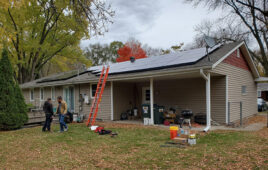On April 7, Massachusetts senators introduced an amended bill (SB 2819) that would help bring some of the state’s climate goals to bear. This legislation comes a year after the governor signed “An Act Creating a Next-Generation Roadmap for Massachusetts Climate Policy.”
The industry applauded the solar-related items in the new “Act Driving Climate Policy Forward,” especially the increase of the state’s solar project net-metering cap from 10 to 25 kW.
“This is an encouraging first step for much-needed climate legislation in Massachusetts, and we’re glad to see the Senate include key provisions for solar deployment in the bill. In addition to expanded exemptions to the state’s solar net-metering cap, the bill requires the Department of Energy Resources (DOER) to recommend the design of a successor to the current SMART program with compensation based on the immense value that solar brings to the electric grid,” said David Gahl, senior director of state affairs, Northeast, for SEIA, in a statement.
“Massachusetts has an opportunity to continue to lead the nation on climate and clean energy. We look forward to working with lawmakers in both chambers on a final bill that supports a strong solar industry in the Commonwealth,” Gahl continued.





We had solar installed 3 years ago. Long story short, when inspected, we were told that we had too many panels on our roof and were ordered to disconnect more than half of them!
So we are told to be energy efficient and use renewable energy, but what the law says is… not be too energy efficient. Don’t make too much renewable energy!!!
I calculated that our house uses about 10 metric tons of burned coal annually. We could eliminate ALL of that, except “THEY” don’t want us to produce FREE energy!
I like the Vermont model where anyone producing solar energy is charged 1% to offset utilities’ upgrade costs to handle this FREE energy.
At this point in our society’s energy consumption evolution it seems only logical to REQUIRE that ALL public buildings be as energy efficient as possible. ALL should take advantage of solar energy AND geothermal and wind power when available.
“The industry applauded the solar-related items in the new “Act Driving Climate Policy Forward,” especially the increase of the state’s solar project net-metering cap from 10 to 25 kW.”
I know part of this “cap” is due to current grid design and stability of the grid in the region. Depending on design of the overall grid, one can send only so much energy back into the grid without affecting the local step-down transformer that takes the higher voltage feeding a housing tract down to 240VAC for each home of the development. I was told by the Engineers at my local utility that I could not have a solar PV system with a maximum output (over) 23% of the step-down transformer’s rating. Micro grids can help remediate this problem by allowing how much energy goes to the grid and how much is stored for later and after hours use.
You are correct, but there is an easy way to deal with this. I’m from Vermont and our Public Utility Commission (PUC) required the utilities to charge a one-time per installed kilowatt fee that goes into a pool to pay for transformer upgrades. This means that very few residential systems have been stopped by grid capacity restrictions since 2016 and those have only been in cases where regional grid upgrades are also needed, which are not paid for from this pool. Before that PUC rule if a grid upgrade was needed they would charge the home owner the full amount, which killed most projects that required grid upgrades.
That’s exactly how grid upgrades are handled in MA now – the homeowner bears the full expense. This is frequently a deal breaker for homeowners who want to go solar.